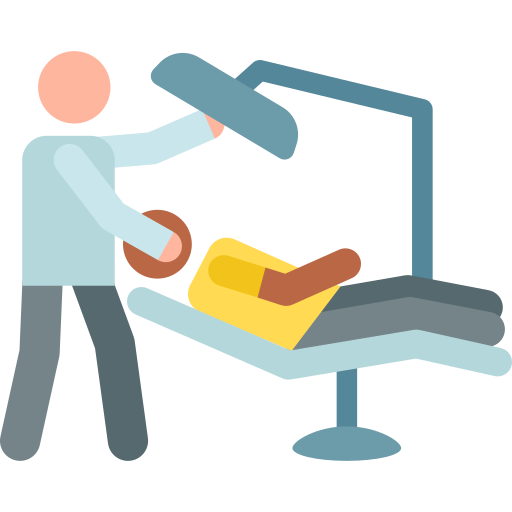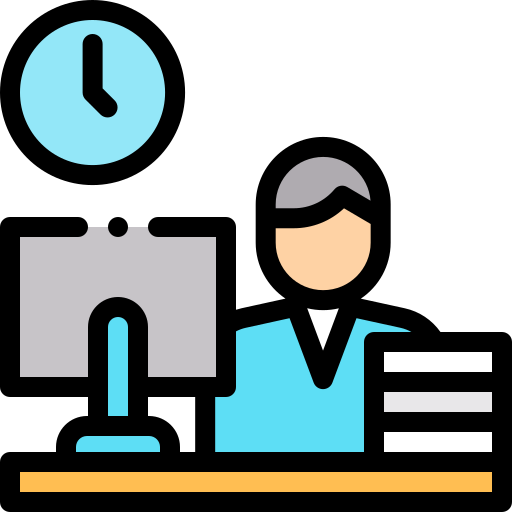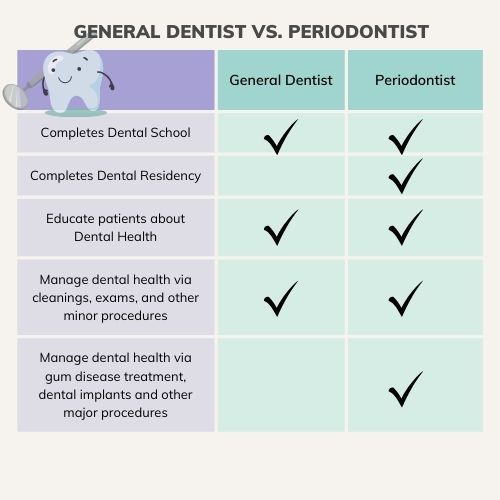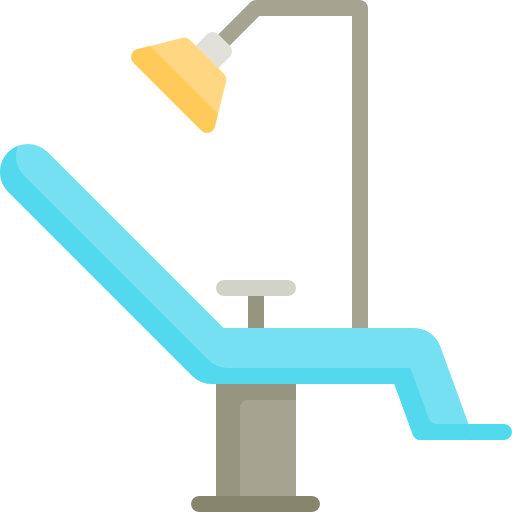Would you like to help increase the confidence of dental patients by improving their smile, replacing missing teeth, and treating gum disease?
Does the sound of miniature drills, saws and hammers, and mouth suction make you salivate?

If you answered "Yes" to any of these questions, you may be interested in becoming a periodontist!
What is a periodontist?
Periodontists focus their practice on the area of periodontics. In their practice, they focus their work on the "prevention, treatment, and diagnosis of the disease of structures surrounding and supporting the teeth," including the gums and bone.

You may have heard of periodontal disease, which is also known as gum disease. Periodontists perform surgical and non-surgical procedures to treat gum disease. They are also experts in replacing missing teeth with dental implants.
Quiz
What tasks might a periodontist do?
What does a typical day look like?
On a given day, you might do any of the following:

Consulting with patients: talking with patients about issues they may have and options for treatment.

Patient treatments: nonsurgical procedures may include gum scaling and root planing, while surgical procedures may include bite contouring, dental implants, or other gum surgeries.

Administrative duties: reviewing and managing patients' records, managing insurance and billing paperwork, coordinating with other providers, and managing staff.

Continuing education: keeping abreast of new advances in oral health and maintaining dental certification.

Following up with patients: after procedures or consultations have been completed, the periodontist meets with patients to monitor their recovery process and address any questions or issues.
The chart below provides a comparison between the general dentist and periodontist careers. While there is an overlap between both careers, periodontists have specialized training and have additional responsibilities.
 Image created by the author in Canva. To hear an audio description of the chart in the image above, click the play button on the audio player below:
Image created by the author in Canva. To hear an audio description of the chart in the image above, click the play button on the audio player below:
How do I become a periodontist?
 Go to college for 4 years
Go to college for 4 years
The first step in becoming a periodontist is to go to college. After you graduate from high school, you should first attend college and obtain your bachelor's degree.
While it doesn’t matter what your major is, you will have to complete specific classes called prerequisites to gain entry into dental school. Some of the science prerequisites you may have to take include courses in general biology, general and organic chemistry, physics, and anatomy & physiology.
As a college student, you should focus on:
Completing course prerequisites
Getting good grades
Finding meaningful extracurricular and leadership activities
Finding internships related to your interest in dentistry
To gain entry into dental school you will have to take the Dental Admission Test (DAT).
 Go to dental school for 4 years
Go to dental school for 4 years
During dental school, you'll learn about the structure and function of the body and the diseases that affect it. You'll also learn about the general practice of dentistry and will get hands-on experience with patients.

After completing dental school, you'll be a dentist and will have a new title! Your future patients will call you "Doctor", as you will have completed your Dental Doctorate degree. Depending on which program you have completed, you will earn either your DDS (Doctorate of Dental Surgery) or DMD (Doctor of Medicine in Dentistry).

Get your dental license
After completing dental school, you will have to get a license to practice in your state or country. This may consist of passing an oral and written exam.

Complete a periodontics residency for 3 years
After completing dental school, you will complete about 3 years of specialized training in periodontics. During this time you will learn about the practice of periodontics and will get specialized training in many areas.
After completing your advanced training, you'll officially be a periodontist!

Get certified
You'll have to get one more certification from the American Board of Periodontology, or the equivalent board in your country.
After this step, you may now go forth and help your patients! Throughout your career, you'll continue to learn about new technologies and advances in your specialty and will grow your skills through your experiences.

Where do periodontists work?
Typical workplaces include:

Private practice: This is the most common type of dental work environment. You own your dental office and equipment and manage practice activities with the help of your staff. You may also work alongside general dentists and other dental specialists.

Dental clinics or hospitals: You may work alongside other dental specialists or medical professionals to treat more severe dental cases, and provide comprehensive dental care.

Academic institutions: You may work as a clinical instructor, educator, or researcher. In your work, you may educate future dentists and residents in the practice of dentistry, act as a mentor, or conduct research on periodontal disease.
Do you have what it takes to become a periodontist?
This career might be for you if you have these qualities:
Commitment: The road to becoming a periodontist is long. It requires commitment, focus, and determination. ✅
Good communicator: You will need to communicate complicated information to your patients effectively and with some compassion. You will also communicate with other medical professionals and administrative staff. ✅
Good hand-eye coordination: You must have good dexterity with your hands to work in your patients' mouths and use dental instruments. ✅
Artistic: The practice of dentistry is "often referred to as an art." Although the practice is focused on improving oral health, a lot of the practice focuses on the appearance of your patients' smiles. ✅
Excited about dentistry: You'll work to improve your patients' oral health daily and should love providing support. ✅
Detail-oriented: Helping patients requires great attention to detail. Missing key details can affect your patients' bite or oral health. ✅

You probably won't like this career if:
You only want to do it for the money. If this is your only motivation to become a periodontist, you might want to explore other careers. The road to becoming a periodontist is long and you will need to have other things to motivate you to pursue this career. ❌
You don’t like dirty work. Working as a periodontist, you will see a lot of blood, see bad teeth, and may smell your patient's bad breath. ❌
You're not passionate about oral health. This should be one of your motivators in pursuing dentistry. ❌
You don't manage stress well. At times, your work or patients can be challenging. You must be able to manage stress, and patients, professionally. ❌

Quiz
What are the best parts of being a periodontist? Select all that apply:
Take Action

Is this the career for you? Do you need more information? To learn more about this exciting career, check out the resources below:
Your feedback matters to us.
This Byte helped me better understand the topic.
